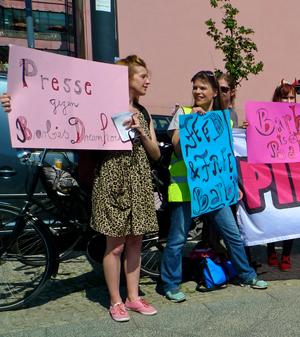Barbie’s Berlin Dreamhouse Draws Protests
PinkStinks protest (Photo: Susan Stone)
Germany’s chancellor Angela Merkel has been called the most powerful woman in the world. But this week, another polarizing female figure has attracted attention in Berlin.
Global icon and plastic plaything Barbie is the star of a new life-size dollhouse that opened on Thursday, though it has provoked protests for weeks now, including a topless woman burning a Barbie strapped to a wooden cross out front – in a giant pink high-heeled shoe.
The flashy pink townhouse (and the shoe) look a bit out of place in gritty urban Berlin, with some East German tower blocks rising up behind it.
But it’s the scene inside that prompted Michael Koschitzki and others from the youth organization of Germany’s political Left Party to form a protest group called Occupy Barbie-Dreamhouse.
“The first room I’ve seen is the kitchen, where children have to do cupcakes, they are doing them virtually,” says Koschitzki. “At the same time Ken is outside the virtual window cleaning the car.”
Since her debut in 1959, Barbie has always been a color-coordinated career girl — from Computer Engineer to Aerobic Instructor, Astronaut to News Anchor.
That’s not the case here, says Koschitzki.
“In this Dreamhouse, there’s really only a one-sided picture presented. You can only be a pop star, or a top model.”
“I was told that no matter what you do in Berlin, there is a protest,” laughs the man behind Barbie’s Berlin Dreamhouse, Christoph Rahofer of EMS Entertainment, who produced the attraction in conjunction with Mattel, the maker of Barbie.
Rahofer says he was surprised by the vitriolic reaction to what he considers family entertainment.
“This is the Barbie Dreamhouse, and we are not meant to be a career opportunity center. We are trying to have fun.”
They’re also trying to make some money. Entering the Barbie Dreamhouse Experience costs 12 euros (about $15) and there’s an additional fee for costumes and makeup to walk the catwalk or sound stage. Naturally, you exit through a gift shop filled with Barbie paraphernalia.
“Ten years ago, we would have said things like that only happen in the US and UK,” says gender researcher Stevie Schmiedel, who heads the group PinkStinks Germany.
She says she thinks the arrival of the Dreamhouse just highlights some troubling questions about German society.
“Sexism that’s out there in advertising, in the toy industry, basically conditions women into accepting that they will enter the workplace and not earn as much as men.”
PinkStinks aims to stop what Schmiedel calls the ‘pinkification’ of girls’ culture, as a way to get at bigger issues. She points out that Germany has the largest gender pay gap in Europe, and German women are more likely than men to be in long-term unemployment, and less likely to hold high-level executive jobs — despite having a woman as head of state.
But should all that really be placed on the shoulders of an 11 ½-inch American doll?
“Based on Barbie’s history, it’s fascinating that the Germans bristle so much about the message that the current incarnation of the Barbie doll is giving to young girls,” says M.G. Lord, author of the book, “Forever Barbie: The Unauthorized Biography of a Real Doll.”
In it, Lord wrote about Barbie’s little-known German origins; Mattel transformed a sexy 1950s German cartoon figure Lilli from the tabloid Bild into a groundbreaking doll — one that allowed little girls to fantasize about single adulthood, not just motherhood.
M.G. Lord says neither the simplified choices offered in the Dreamhouse Experience, nor the protesters’ knee-jerk reactions do justice to Barbie’s history.
“I think it’s reductionist to assume that Barbie represents an ideal of womanhood, or that Barbie is wholly negative and represents some really damaging image of womanhood. I mean she’s just a plastic object. Children can play with her as they see fit,” Lord insists.
And they do — Mattel says a Barbie is sold every three seconds somewhere in the world. As for the Barbie Dreamhouse Experience, another, permanent, version opened last week in Florida, to no protest at all.
Barbie’s controversial Berlin abode will remain in the city until August 25th – then it will wend its pink way throughout Germany, and on to the rest of Europe.
The story you just read is accessible and free to all because thousands of listeners and readers contribute to our nonprofit newsroom. We go deep to bring you the human-centered international reporting that you know you can trust. To do this work and to do it well, we rely on the support of our listeners. If you appreciated our coverage this year, if there was a story that made you pause or a song that moved you, would you consider making a gift to sustain our work through 2024 and beyond?
